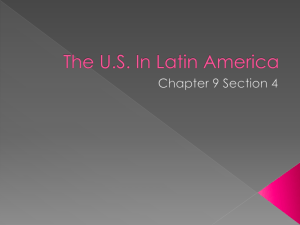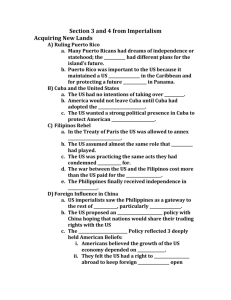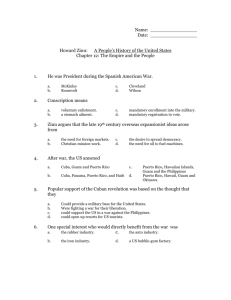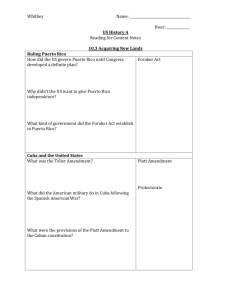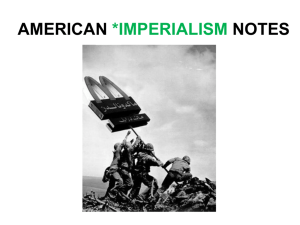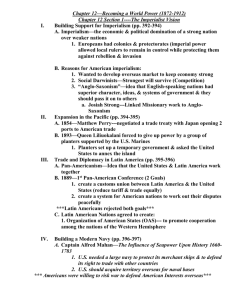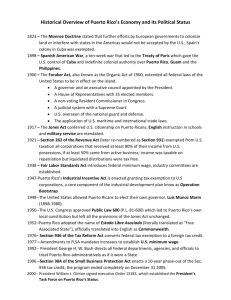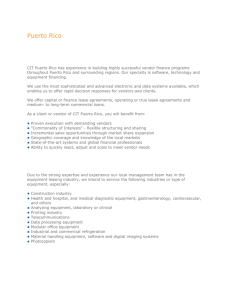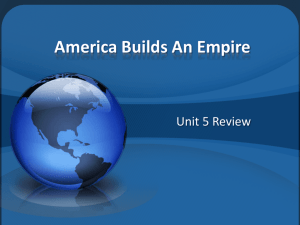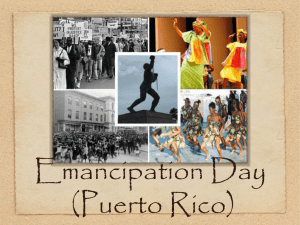The Story of Latin America Imperialism
advertisement
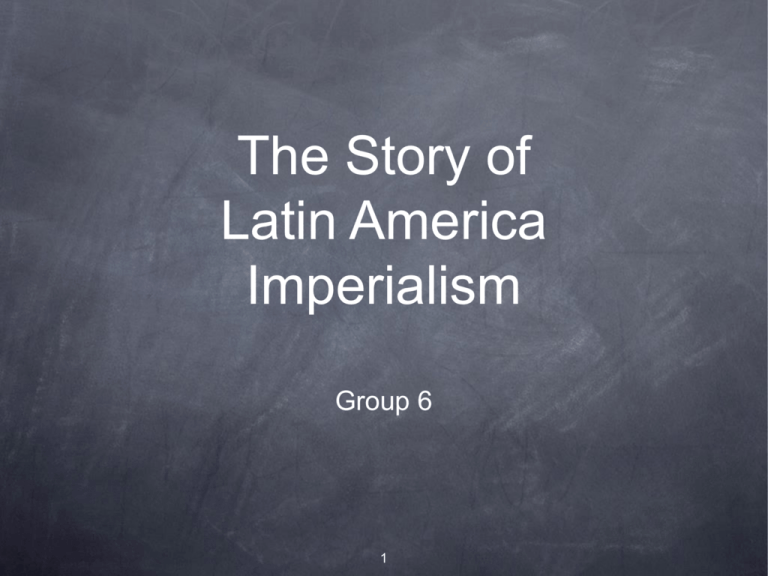
The Story of Latin America Imperialism Group 6 1 2 Key Terms Foraker Act - 1900 Act providing a civil government for Puerto Rico; a main goal of the act was to prepare Puerto Rico for free trade with the US. It gave most power in Puerto Rico to US-appointed officials. Platt Amendment - 1901 amendment to the Cuban constitution by which the US was allowed certain concessions, including the right to indefinitely maintain Guantanamo naval base in Cuba. USS Maine - American warship sent to patrol Cuban waters at the beginning of 1898. When the ship mysteriously exploded on February 15, 1898, it gave the US a final reason to go to war, even though the cause of the explosion is still debated today. Yellow journalism - The type of sensationalist (sometimes fictitious) journalism practiced by newspapermen such as Hearst and Pulitzer in order to boost circulation. Protectorate - A country or territory with its own internal government but under the control of an outside power 3 What? Spanish-American War, the Panama Canal project, Monroe Doctrine, Dollar Imperialism, and the Roosevelt Corollary, Haiti, Puerto Rico 4 WHY? Many Caribbean and Latin American were in revolutions and political unrest A lot of the Latin American regions were in deep debt “Non-colonial imperial expansion” Can insert in laws that will allow American businesses to have an advantage. 5 Spanish-American War The Spanish–American War was an armed military conflict between Spain and the United States that took place between April and August 1898, fourt months) over the issues of the liberation of Cuba. Treaty of Paris ended the war 6 Cause of Spanish-American War American demand for a compromise in Cubans struggle for independence was rejected by Spain Economic Reason Monroe Doctrine Expansionist feelings Yellow Journalism Maine 7 Maine 8 Yellow Journalism 9 10 Results of the Spanish American War America’s involvement increases in Asia and South America Cuba gains independence America is recognized as a world power 11 Consequences on America America successfully controlled and handled the “splendid little war" Ensured a constant U.S. military presence in the Caribbean and Central America for decades Treaty of Paris gave United States control over Cuba, the Philippines, Puerto Rico, and Guam 12 After Spanish American War U.S. sets up an military government in Cuba U.s. fears that other imperialist nations might try to take control of CUba after SpanishAmerican War Platt Amendment U.s. Withdraws troop but maintains a base. 13 Imperialism of Cuba General John Brooks becomes leader of the occupation government Newly promoted General Leonard Wood, former leader of the Rough Riders becomes leader of the second occupation government 14 The Good Wood’s main goal was to improve Cuban life He modernized education, agriculture, government, healthcare, and so forth Wood also had Havana's harbor deepened, in preparation for a higher volume of trade with the US. Wood followed Dr. Walter Reed’s advice and destroys many swamps, marshes; reduces frequency of yellow fever cases 15 The Bad Wood set up structure in place so that AfroCubans would be kept out of politics Raised resentment 16 The UGLY The Teller Amendment was a promise to withdraw entirely from Cuba after the Spanish American War U.S.: honored promise but forced Cubans to write the Platt Amendment into their constitution Platt Amendment gave U.S. a Cuban base (Guantanama) Cubans: resented that the U,S. had left a military base 17 Latin American (Cuban) Viewpoint Resented U.S. intervention Resented military government Resented U.S. preventing it to become truly independent America’s control of the Dominican Republic’s customhouses helped bring short-term financial security to the nation. 18 Platt Amendment Treaty between the United States and Cuba embodying the provisions defining the future relations of the United States with CUba contained in the act of Congress” Limits Cuba’s ability to sign treaties with other nations and gave U,.S. right to intervene in CUban affairs Cuban becomes protectorate of U.s. 19 “Dollar Diplomacy” William Howard Taft believed in economic expansion, and so therefore introduced "dollar diplomacy." The “dollar diplomacy” was to advance and protect American businesses in other countries. The term is also used historically by Latin Americans to show their disapproval of the role that the U.S. government and U.S. corporations have played in using economic, diplomatic and military power to open up foreign markets. 20 Monroe Doctrine The era of colonization had ended Threat of European powers to the Western Hemisphere America would avoid affairs with Europe 21 Roosevelt Corollary “Big Stick” Policy Roosevelt adds the Roosevelt Corollary to the Monroe Doctrine Roosevelt warns that disorder in Latin America might “force the U.S. to exercise of an international police power 22 23 American View Use economic power to achieve policy goals Undermine the chances of European interference in America’s imperialism in Latin America 24 Latin American Debts Latin America, and many of the “Banana Repulic” began owing heavy debts to European powers such as Germany and England German warships sank two Venezuelan vessels and bombarded a Venezuelan town Threatened America’s security 25 International Policemen Venezuela failed to pay debts Europe retaliates Dispute settled by Roosevelt 26 Puerto Rico President McKinley wants to restore order and protect American Investments Puerto Rico, which became an American protectorate under the Treaty of Paris, was very poor. US troops were welcomed in 1898, and the Puerto Ricans greatest hopes were for increased rights and a better economy. 27 The Good Puerto Rico's experience under US rule was more positive than that of the Philippines. In 1900, Congress passed the Foraker Act, which set up a civil government for the Puerto Ricans, and gave the Puerto Ricans some amount of self-government. The US went right on working to Americanize Puerto Rico, importing institutions, language, political systems, and the like. 28 The Bad However, most power still belonged to officials appointed by the US government, a fact which angered many Puerto Rican natives. 29 The UGLAY However, U.S. was always vague over Puerto Rico’s political future Resistance movement, led by Luis Munoz Rivera 30 The HAPPY Gradually, the US granted more and more concessions to the Puerto Ricans 1917, Puerto Ricans were made US citizens, with full citizens' rights. 31 Panama Canal People wanted a faster way to travel back and forth from the Atlantic to Pacific and vise versa U.S. buys right to canal and tries to sign treaty with Columbia to build canal Columbia refuses to sign treaties Panamanian revolutionaries want to break off from Columbian; Teddy ecnourages them Teddy supports revolution Nation of Panama signs treaty to give U.S. control over the Canal zone and permission to build the Panama Canal 32 American Viewpoint Good deal; the Panama canal cut the original journey of about 13,000 miles into half the length of the journey They collected about $340 million a year at the Panama Canal tollgate 33 Latin America (Panama) Viewpoint Panama took control of the canal on December 31, 1991 Happy because Latin America had become a cross world of world trade. 34 Haiti The U.S. government's official reason for invading was to protect human rights and restore democracy. This interest in Haiti was part of the larger Caribbean plan, which in turn was part of the broader effort by the U.S. to become an imperialist power capable of challenging its European rivals. America wanted to stop its rivals, particularly Germany, from acquiring more influence. 35 Consequences of Haiti being Imperialized America wrote and imposed a convention giving the U.S. the right to police the country and take control of public finances. 36 Consequences of Haitian (The Good) Successful maintenance of foreign debt repayment was in fact probably the only "positive" achievement of the nineteen-year occupation Learned how to build prisons 37 Feelings of Haitians Expressed (The Bad) Majority of Haitians were against the occupations and opposed Nationalist sentiments (“Indigenist,” “Haitianist,” or “”Africanist” Black nationalism 38 Feelings of Haitians Expressed (The UGLY) Rebellions in which Haitians were crushed America raises taxes and “postpones” elections of a hated president due to a economic recession cause by the coffee market Haitians rebel furiously and burn down marine homes 39 U.S. pulls out..after 200 years U.s. agrees to pull out on conditions U.S. government would maintain supervision of Haitian finances 40 U.S. Empire Pledging that it was fighting a war against empire with anti- imperialist statements like the Teller Amendment, the US somehow emerged from this originally anti-imperialist war with an empire of its own. dualism in American foreign policy; U.S.’s not imperialism actions always help U.S. foreign policies 41 U.S. Empire As a further result of the war, US national pride soared, and nationalism and jingoism peaked. The US took a first successful step onto the world stage. Finally, the Spanish-American War offered a sign that the US really was a union again. For the first time since the Civil War divided the country, Northern and Southern soldiers had fought on the same side against a common enemy. 42 Consequences for Latin America had a few brief moments where it was not in a complete revolution rose the distrust and fear of people living in latin America as America kept failing to bring peace to the region. 43 Latin America Was imperialized by America Was modernized in education Resented America’s constant military intervention 44 Bibliography “Remember the Maine.” 14 Jan 2009 <http://www.smplanet.com/imperialism/remember.html>. “The Press and Spanish-American Relations in 1898.” 14 Jan 2009 <http://www.humboldt.edu/~jcb10/spanwar.shtml>. “SparkNotes: The Spanish American War (1898-1901): Important Terms, People, and Events.” 14 Jan 2009 <http://www.sparknotes.com/history/american/spanishamerican/terms.html>. “The Panama Canal.” 14 Jan 2009 <http://www.smplanet.com/imperialism/joining.html>. static.schoolrack.com/files/10739/72878/Causes_and_Effects_of_US_imperialism.ppt - 45
